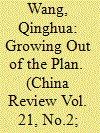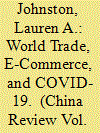|
|
|
Sort Order |
|
|
|
Items / Page
|
|
|
|
|
|
|
| Srl | Item |
| 1 |
ID:
180450


|
|
|
|
|
| Summary/Abstract |
Cross-national opinion surveys reveal that the Chinese regime enjoys perplexingly high levels of political trust when compared internationally. However, by tracing multiple surveys over time, this study finds that trust in the Chinese central government has declined notably since the early 2000s. We identify rising public criticism of income inequality as an underlying cause for the declining political trust during the surveyed period. We propose the concept of authoritarian critical citizens to understand the impact of citizens’ evaluation of specific government performance on diffuse support in authoritarian contexts. Whereas in democracies the rise of critical citizens may not undermine regime support, we argue that the rise of authoritarian critical citizens poses serious challenges to the Chinese party-state because the decline of specific support erodes the legitimacy and support of authoritarian regimes.
|
|
|
|
|
|
|
|
|
|
|
|
|
|
|
|
| 2 |
ID:
180446


|
|
|
|
|
| Summary/Abstract |
While the profile of China has been growing in Europe in recent years, COVID-19 has put the country at the center of the attention of both policymakers and the general public. Because of this shift, the role of public opinion may be more important than ever in orienting the strategic choices that the European Union (EU) faces in its China policy. However, we lack a systematic understanding of European attitudes toward China and the role that Chinese public diplomacy plays in shaping them. As such, this article addresses two research questions. First, what was the content and style of China’s public diplomacy in the EU during the pandemic? Second, what did European public opinion of China look like during the pandemic? To tackle these questions, we use a mix of qualitative and quantitative methods, including our own extensive public opinion data, to focus on ten representative EU member states. Through our research, we find a visible correlation between the intensity, style, and content of China’s public diplomacy in Europe during COVID-19 and European public opinion on China. Future research could further explore this link and try to establish and test the casual direction.
|
|
|
|
|
|
|
|
|
|
|
|
|
|
|
|
| 3 |
ID:
180447


|
|
|
|
|
| Summary/Abstract |
The COVID-19 pandemic has been discussed as strengthening nationalist as opposed to globalist forces around the world. While this may be the case in some countries, in others we can observe an increasing political polarization between the “globalists” and “nationalists” rather than a unification against an “outside enemy.” The article presents a case study of the Czech Republic, which has long had a turbulent relationship with China. We show how the coronavirus pandemic has escalated the polarization of Czech politics, in which China has become a symbol of the major political fault line. We argue, first, that the vastly different attitudes of Czech officials vis-à-vis China are not the result of their changing opinions in time. Instead, the electoral reshufflings elevate politicians with significantly different views of China. Second, we argue that although the political division may today appear to be symbolized by its approach toward the Communist legacy, the division actually goes to the 19th-century debate about the Czech national identity. Eventually, we end up with a discussion on how the image of China in a faraway country is being formed to a large extent following the domestic political dynamics rather than being driven by the significantly more powerful China.
|
|
|
|
|
|
|
|
|
|
|
|
|
|
|
|
| 4 |
ID:
180452


|
|
|
|
|
| Summary/Abstract |
The Trump administration has shown a strong inclination to play the “Taiwan card” and strengthen relations with Taipei in lieu of Washington’s traditional strategic ambiguity. As the U.S.-China trade competition escalated after 2018, the contending bilateral relations between Beijing and Washington created an opportunity for the administration of Tsai Ing-wen to adopt a more provocative strategy toward Beijing. In order to prevent conflict resulting from Taiwan’s new approach, more fundamental discussions on the definitions and dynamism of why the United States should adjust this traditional security policy are needed, this research suggests, in order to address the question of whether the United States should change to strategic clarity across the Taiwan Strait or adhere to its traditional strategic ambiguity. Moreover, this study also covers relevant literature on strategic ambiguity, investigating the changing patterns of decision making in U.S. foreign policy with regard to cross-Strait relations and U.S. arms sales to Taiwan.
|
|
|
|
|
|
|
|
|
|
|
|
|
|
|
|
| 5 |
ID:
180449


|
|
|
|
|
| Summary/Abstract |
China adopted rigorous lockdowns and restrictions to contain the spread of COVID-19 from 23 January to 8 April 2020. Although the quarantine severely limited people’s freedom and caused multiple secondary disasters, most Chinese citizens tolerated it. Based on an online survey conducted at the beginning of the lockdown (from 31 January to 4 February 2020), we argue that local governments in many parts of the country gained more trust than usual, narrowing the trust gap with the central government. In the early stage of the pandemic, effective implementation of anti-COVID policies, official media propaganda, and public expectation all contributed to the public’s increased confidence in local governments.
|
|
|
|
|
|
|
|
|
|
|
|
|
|
|
|
| 6 |
ID:
180453


|
|
|
|
|
| Summary/Abstract |
This article examines market-oriented reforms in China’s graduate placement system (GPS) of higher education during 1978–1994 when China’s GPS was transformed from a state-controlled and centrally planned Soviet type to a rudimentary market model. Its goals are twofold. First, it advances the scholarship on GPS reform, a subject that is underresearched in studies of Chinese politics and of Chinese education. Second, it analyzes reform features by engaging the “gradualism” school on the political economy of China’s economic transition, especially Barry Naughton’s widely accepted “growing out of the plan” version of Chinese “gradualism” in 1978–1993. Through this process, the article sheds light on our understanding of the perennial debate about China’s economic transition. We argue (1) that GPS reform during 1978–1994, in retrospect, adopted a gradualist “dual-track” approach and was successful, much like China’s economy in that period; and (2) that the applicability of perspectives of the “gradualism” school can be extended from the customary confines of economic sectors to a social policy sector of higher education.
|
|
|
|
|
|
|
|
|
|
|
|
|
|
|
|
| 7 |
ID:
180451


|
|
|
|
|
| Summary/Abstract |
As an authoritarian state, the Chinese government needs to adapt its policies and make them more effective in serving local development requirements. With this in mind, Xi Jinping has introduced “new-style think tanks with Chinese characteristics” capable of facilitating the formulation, introduction, and adaptation of new policies. This article uses the case of think tanks specializing in Taiwan-related issues in Fujian province to analyze how both university and private think tanks propose policies promoting local development in line with the central government’s 31 Measures for Taiwan. We analyze three areas of think tank work: policy suggestions and recommendations, surveys and information collection, and policy evaluation. We conclude that the role of Chinese think tanks is to ensure the survival of the authoritarian regime. They are not independent actors with independent sources of financial support. As policy advisers to an authoritarian state, think tanks are used by the Chinese Communist Party (CCP) to enhance its performance and refine its policies.
|
|
|
|
|
|
|
|
|
|
|
|
|
|
|
|
| 8 |
ID:
180445


|
|
|
| 9 |
ID:
180448


|
|
|
|
|
| Summary/Abstract |
In 2016 Alibaba founder Jack Ma founded eWTP as both a commercial and a digital world trade lobbying platform. COVID-19 provided an important window for eWTP to demonstrate the power of its commercial digital commerce network for both commerce and aid purposes. Relief items, sold and donated, were rapidly distributed from China across Asia, Africa, and Europe. This article explains eWTP in principle and in practice. Evident is that eWTP played an important, targeted, and expansive role during the crisis and has demonstrated a capacity to unlock trade for developing countries and small and medium enterprises. It is, however, too early to tell if this will convert to long-run gains for eWTP itself. This owes to the pandemic having served as a bigger springboard for both the commercial and regulatory agenda that eWTP has been a front-runner of. The net long-run impact for eWTP is hence unclear.
|
|
|
|
|
|
|
|
|
|
|
|
|
|
|
|
|
|
|
|
|